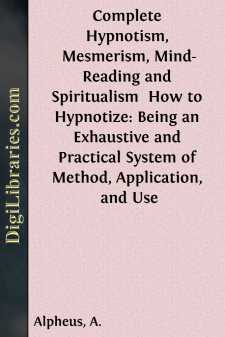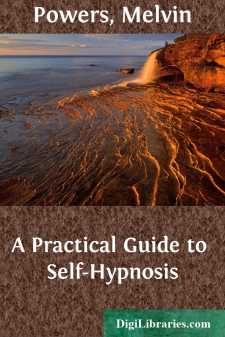Psychology
Psychology Books
Sort by:
by:
A. Alpheus
INTRODUCTION. There is no doubt that hypnotism is a very old subject, though the name was not invented till 1850. In it was wrapped up the "mysteries of Isis" in Egypt thousands of years ago, and probably it was one of the weapons, if not the chief instrument of operation, of the magi mentioned in the Bible and of the "wise men" of Babylon and Egypt. "Laying on of hands" must...
more...
by:
Melvin Powers
FOREWORD All of us like to think that our actions and reactions are a result of logical thought processes, but the fact is that suggestion influences our thinking a great deal more than logic. Consciously or unconsciously, our feelings about almost everything are largely molded by ready-made opinions and attitudes fostered by our mass methods of communication. We cannot buy a bar of soap or a filtered...
more...
A DOMINIE IN DOUBT I. "Just give me your candid opinion of A Dominie's Log; I'd like to hear it." Macdonald looked up from digging into the bowl of his pipe with a dilapidated penknife. He is now head-master of Tarbonny Public School, a school I know well, for I taught in it for two years as an ex-pupil teacher. Six days ago he wrote asking me to come and spend a holiday with him, so...
more...
PREFACE. The publishers of this work offer no apology for presenting it to the reading public, since the wide prevalence of the evils which it exposes is sufficient warrant for its publication. The subjects with which it deals are of vital consequence to the human race; and it is of the utmost importance that every effort should be made to dispel the gross ignorance which almost universally prevails,...
more...
SENSES. Sight.—Light.—Five minutes after birth, slight sensibility to light (2). Second day, sensitiveness to light of candle (3). Sixth and seventh days, pleasure in moderately bright daylight (3, 4). Ninth and tenth days, sensitiveness greater at waking than soon afterward (3). Sleeping babes close the eyes more tightly when light falls on the eyes (4). Eleventh day, pleasure in light of candle...
more...
THE MIND AND ITS EDUCATION THE MIND, OR CONSCIOUSNESS We are to study the mind and its education; but how? It is easy to understand how we may investigate the great world of material things about us; for we can see it, touch it, weigh it, or measure it. But how are we to discover the nature of the mind, or come to know the processes by which consciousness works? For mind is intangible; we cannot see...
more...
ORGANIC DIFFERENCES IN THE SEXES A grand difference between plant and animal life lies in the fact that the plant is concerned chiefly with storing energy, and the animal with consuming it. The plant by a very slow process converts lifeless into living matter, expending little energy and living at a profit. The animal is unable to change lifeless into living matter, but has developed organs of...
more...
Inferences from Haunted Houses and Haunted Men The lack of interest in so-called psychical matters is somewhat surprising. There is, however, more hope of the clearing up of the scientific aspects of these phenomena than ever before. Sir William Crookes, late President of the British Association, has no doubt that thoughts and images may be transferred from one mind to another without the agency of the...
more...
I The fact of sexual need in man and animal is expressed in biology by the assumption of a "sexual impulse." This impulse is made analogous to the impulse of taking nourishment, and to hunger. The sexual expression corresponding to hunger not being found colloquilly, science uses the expression "libido." Popular conception makes definite assumptions concerning the nature and qualities...
more...
CHAPTER ITHE PROBLEM DEFINED What is sex? Asexual and mixed reproduction; Origin of sexual reproduction; Advantage of sex in chance of survival; Germ and body cells; Limitations of biology in social problems; Sex always present in higher animals; Sex in mammals; The sex problem in the human species; Application of laboratory method. Sex, like all complicated phenomena, defies being crowded into a...
more...











